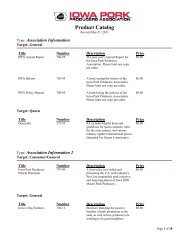Pork Congress 2012 - Iowa Pork Producers Association
Pork Congress 2012 - Iowa Pork Producers Association
Pork Congress 2012 - Iowa Pork Producers Association
You also want an ePaper? Increase the reach of your titles
YUMPU automatically turns print PDFs into web optimized ePapers that Google loves.
USDA GIPSA Final Rule on 2008 Farm Bill<br />
contracting requirements now in effect<br />
By Eldon McAfee, IPPA legal counsel, Beving, Swanson & Forrest, P.C.<br />
The long-awaited and controversial final rule on<br />
federal swine and poultry contracting requirements<br />
was released by the USDA Grain Inspection, Packers<br />
and Stockyards Administration (GIPSA) in December.<br />
The rule went into effect on Feb. 7, <strong>2012</strong>, and applies<br />
to contracts “entered into, amended, altered, modified,<br />
renewed or extended” after that date.<br />
Before analyzing the final rule, it is important to note<br />
that the final rule does not change the current GIPSA<br />
legal actions penalizing packers and contractors for<br />
failing to have disclosures in contracts regarding<br />
arbitration and court venue clauses, as well as<br />
legal actions against contractors for failing to have<br />
disclosures regarding the three-day right to cancel<br />
contracts and additional large capital investment<br />
requirements. Contractors must continue to review<br />
their contracts entered into, amended, altered,<br />
modified, renewed or extended after June 18, 2008, for<br />
compliance with these requirements.<br />
It also is important to note that each section of the<br />
final rule sets out criteria that GIPSA may consider<br />
in determining if there is a violation and each section<br />
states that “these criteria include, but are not limited<br />
to” the specific criteria listed. The effect of GIPSA’s<br />
broad discretionary language is that the rule allows<br />
GIPSA to use criteria in each of the three sections in<br />
addition to the listed criteria and producers and others<br />
subject to the rules cannot be certain what criteria they<br />
must follow to comply with the rules.<br />
Some of the most controversial sections of the rule<br />
proposed in June of 2010, such as pricing premiums<br />
and packer-to-packer sales, were withdrawn from<br />
the final rule by GIPSA. The final rule includes the<br />
following three sections:<br />
Additional Capital Investments Criteria<br />
This section applies to swine and poultry production<br />
contracts. Other than including the disclosures as noted<br />
previously in this article, contractors may not need to<br />
include any specific contract language to comply with<br />
this section of the rule. <strong>Producers</strong> should review the rule<br />
definition of additional capital investment (in essence,<br />
“a combined amount of $12,500 or more per structure”<br />
and maintenance or repair costs are excluded) and<br />
the criteria GIPSA may consider to determine if there<br />
is a violation. If a contract requires additional capital<br />
investments, contract language must conform to those<br />
criteria. More importantly, regardless of whether the<br />
contract requires additional capital investments, these<br />
criteria should be reviewed at the time of any additional<br />
capital investment and the contractor and contract<br />
grower should sign a contract addendum which lists<br />
each criteria in the rule, and any others that may be<br />
applicable, and which states that the criteria have been<br />
reviewed and complied with, including the criteria<br />
that the grower had discretion to decide against the<br />
investment.<br />
Reasonable period of time to remedy a<br />
breach of contract<br />
This section applies to swine and poultry production<br />
contracts. The criteria GIPSA may consider in<br />
determining whether a requirement that a swine<br />
production contract grower or poultry grower has<br />
been provided a “reasonable period of time to remedy<br />
a breach of contract that could lead to contract<br />
termination” include but are not limited to (these<br />
criteria do not apply where “food safety or animal<br />
welfare is concerned”, but note that GIPSA did not<br />
exclude environmental emergencies):<br />
1. Whether the grower was provided written notice<br />
of the breach upon initial discovery of the breach<br />
if the other party to the contract intends to take<br />
an adverse action, including termination, against<br />
the grower.<br />
2. Whether the notice of breach includes:<br />
a. A description of the act or omission believed<br />
to be a breach, including the contract believed to<br />
have been breached<br />
52 March <strong>2012</strong>













